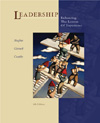PREFACE TO THE FOURTH EDITION The fourth edition contains several significant changes we believe will further enhance the text's usefulness. An overarching
goal was to reduce the length of the text, even knowing there would be new material added in this edition. This reduction was
accomplished through certain formatting changes as well as by deletion of certain material deemed less central to the major
sections of the book and its overall theme. There have been two significant changes to Part I ("Leadership Is a Process, Not a Position"). One change involves moving
the chapter on contingency chapters of leadership. In the third edition, this chapter was in Part I. In this new edition, that
chapter has been moved to Part IV (Chapter 12), similar to its placement in the book's second edition. Ironically, it was
feedback from the second edition that led us to place the chapter in the introductory material. That chapter is so complex and
integrative, however, that its early placement simply did not work. We believe the student's introduction to the book's overall
perspective on leadership (i.e., Part I overall) will be clearer with the contingency chapter appearing later; and we believe the
chapter itself will be better understood and appreciated by students who will now have greater breadth in the subject matter
before they get to it. The other significant change to Part I involved significant revision to the chapter on assessing leadership
and measuring its effects (Chapter 4). This has been a problematic chapter in every edition of the book. We do understand
that a chapter on methodological issues is unlikely to be one of the more popular ones to either students or instructors. On the
other hand - after serious consideration of simply doing away with the chapter entirely - we chose to revise and reframe it.
Leadership is a topic that seemingly everyone has an opinion on, and we believe it essential to raise the question of "How do
you - or others - know what you claim to know about leadership?" We see that as the essential contribution of that chapter to
the text's purpose. Part II begins again with a chapter on power and influence (Chapter 5), and this chapter remains essentially unchanged from
the second edition. The next chapter in Part II deals with leadership and values, and has expanded material on how
globalization is making the issue of values ever more salient for leaders. We also eliminated the section on attitudes from this
chapter, which gives the chapter greater continuity and focus. The remaining chapters in Part II have changed rather
considerably. There are now just two other chapters in "Focus on the Leader" whereas in the last edition there were four. The
chapter on leadership behavior (Chapter 8) remains substantially the same, but this edition's chapter on leadership traits
(Chapter 7) contains "best of" material from the previous edition's chapters on personality, intelligence and creativity, and
charismatic leadership. Our treatment of transactional and transformational leadership now appears in Part IV of this edition
(Chapter 13). Part III ("Focus on the Followers") has been shortened by eliminating a chapter that seemed somewhat redundant with the
material on followers and followership in Part I. The two chapters remaining in Part III (new Chapters 9 and 10) have been
updated but remain otherwise similar in structure and content. There are two major changes to Part IV ("Focus on the Situation"). One has been mentioned already: inclusion of the chapter
on contingency theories of leadership here (Chapter 12) rather than in Part I. The other is a whole new chapter dealing with
issues of leadership and change (Chapter 13). The impact of the nature and pace of change in our world today on the subject
of leadership as well as how the nature of leadership itself is about change led us to believe this new chapter represents a
significant contribution to the book, and we believe an appropriate subject with which to conclude the book's chapter-by-
chapter structure. The book concludes, as it did in the third edition, with a lengthy section dealing with leadership skills. There have been few
changes to the content of this section other than the addition of an additional perspective on team development. On the other
hand, we believe the usefulness of this material is enhanced in this edition by a brief section at the end of each of the preceding
thirteen chapters indicating which specific leadership skills are most relevant to the content of that particular chapter. As we noted earlier there also are several important format changes to the book. For example, outlines at the beginning of
each chapter have been eliminated. The "Leadership Quotes" still appear in every chapter but now they are interspersed
through each chapter in the margins rather than in a dedicated Highlight. And speaking of the Highlights, we have trimmed
those down wherever possible, again with the objective of reducing the book's length. Several new Highlights have been
added, and other Highlights from the previous edition have been deleted entirely. One final change we might mention has
been more frequent reference to the "three leaders" (Colin Powell, Madeleine Albright and Konosuke Matsushita) throughout
the text, indicated by special symbols in the text margins. There are a number of individuals we wish to thank for their significant contributions to this edition. We deeply appreciate the
enthusiastic encouragement, guidance and support of our friends and colleagues at Irwin/McGraw-Hill, including Sara Strand,
Andy Winston, John Biernat, Anna Chan, Ellen Cleary, and Dana Woo. We are also indebted to a number of individuals whose evaluations and constructive suggestions about the previous edition
provided the foundations for our revisions. We are grateful for the scholarly and insightful comments of Donald Cassiday,
Patricia Castelli, Ahmad Tootoonchi, David Day and Diane Torry. | 



 2002 McGraw-Hill Higher Education
2002 McGraw-Hill Higher Education